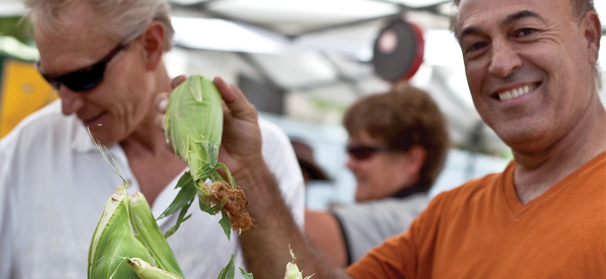

Nov 13, 2014Association seeks to unite Colorado’s fruit, vegetable growers
A small but expanding group in Colorado is carefully nurturing a new association that brings together fruit and vegetable growers from all the key growing regions in the state.
The Colorado Fruit and Vegetable Growers Association (CFVGA) was officially launched in February, but the seeds were gathered several years earlier. In 2011, Mike Bartolo, a vegetable specialist with Colorado State University (CSU) Extension, applied for a grant to fund the formation of an association that would bring together the diverse array of growers in the state to share information and address common roadblocks to success, according to Adrian Card, a CSU Extension agent and member of CFVGA’s board of directors.
Whether growing fruit or vegetables on large farms or small, using conventional or organic methods, marketing to wholesalers or selling produce at a farm stand, all growers face many of the same issues. Bartolo felt that having a unified voice would help all growers tackle the common, and often complex, issues they face. Food safety, recruiting and retaining farm labor and water issues are at the top of the list of concerns, Card said.
While there are a number of different associations in the state for growers of specific crops, including grapes and potatoes, CFVGA is the first to bring together all of the state’s produce farmers regardless of size, crop or market, Card said.
“The association unites all the growers out there,” he said. “Having that united voice for those issues is our unique niche.”
Robert Sakata, CFVGA’s president, said Colorado farmers are huge suppliers of many commodities that don’t have specific groups supporting them.
“For lettuce, we’re ranked fourth in the nation, and yet we don’t have an organization or association representing them,” Sakata said in an interview with KSIR Radio, part of a podcast posted on CFVGA’s website. “We produce so many great fruits and vegetables in this state that I think it will be great to have a single voice.”
It took longer than expected to get the new organization off the ground. The listeria outbreak that impacted Colorado’s melon industry several years ago temporarily delayed plans for the association. In 2012, CSU Extension agents convened focus groups to discuss agricultural issues around the state and asked growers if they’d be interested in meeting more often. The response was favorable, and focus groups were reconvened the following winter, when growers were polled, Card said.
“We asked if anyone was interested in joining an association and they all said ‘yes,'” Card said. “This is an idea whose time has arrived.”
Industry representatives tried to establish a similar association about 20 years ago, said Bruce Talbott of Talbott Farms, a CFVGA board member. That effort failed because of the challenges of bringing together growers from the western and eastern parts of the state.
Talbott, who grows 30 varieties of peaches and 26 varieties of grapes on a 470-acre farm west of Denver, is optimistic about the new association.
“I have high hopes for its future,” Talbott said. “We’d like to see everybody succeed.”
One of CFVGA’s goals is to be an information portal for farmers, and disseminate information through its newsletters, website and membership alerts. Another goal is to provide an industry voice to local, state and federal officials. Other goals include helping growers manage risks, reduce production costs and expand their markets. The association is also working to promote state crops and provide networking opportunities, Talbott said.
The association also will serve as a clearinghouse for the media. Reporters looking to interview someone about a certain crop or issue will be able to call CFVGA and be connected with the appropriate source, Sakata said.
Sakata is optimistic the new nonprofit will have a positive impact.
“I am extremely excited to be part of this effort,” said Sakata, who grows onions, sweet corn, cabbage, field corn, pinto beans and wheat on a 2,500-acre farm in Brighton, Colorado. “And I feel extremely fortunate that we have energetic partners Adrian Card and Michael Bartolo through our Cooperative Extension Service.”
The association relies on modern technology to bring together growers from all over Colorado.
“We started doing video conferencing by Skype,” Card said, noting the practice has been successful in enhancing communication and helping growers establish personal relationships with counterparts from other areas of the state.
Since its inception, the group has recruited 64 members, established a board of directors, drafted bylaws and held meetings. The current board includes Card, Bartolo and two other representatives from Extension, along with seven growers from various parts of the state. The Tri-River region in western Colorado, the Arkansas Valley region and the northern region each have two representatives on the board, while the San Luis Valley has one. The board also has two open seats for growers from the southwest region. Initial board members will serve one- and two-year terms, but future members will be elected by the membership for three-year terms, according to CFVGA.
“We’ve grown slowly and have taken the time to hear from our growers,” Card said.
He hopes membership will grow to include 10 percent or more of the state’s 1,505 fruit and vegetable farmers. Annual membership rates vary, depending on farms’ annual incomes.
Membership is also open to produce suppliers, buyers, retailers and consumers.
Grant funding from USDA, funneled through the Colorado Department of Agriculture, allowed CFVGA to get up and running and hire an administrator and two contractors, according to the association.
– Terry Morgan














